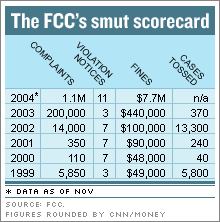NEW YORK (CNN/Money) - The nation's top decency cops could probably use a holiday.

In the home stretch of 2004, the Federal Communications Commission, the official enforcer of the nation's anti-smut standards, has so far received more than a million complaints about public radio and television programming. That's a record and so is the close to $8 million in fines levied, half of them against Clear Channel Communications and Viacom.
The numbers suggest a few things: the minds of entertainment industry honchos are getting a whole lot dirtier, Americans are fed up, and indecency watchdogs in Washington, D.C. are writing tickets faster than a traffic cop on a quota.
But things are never what they suggest.
MediaWeek, an entertainment industry trade journal, reported last week that just about 100 percent of the complaints filed in 2003 and 2004 (not counting the 530,000 official gripes over the Janet Jackson episode) were filed by the Parents Television Council, a 10 year-old group boasting more than a million members whose self-described goal is "to restore television to its roots as an independent and socially responsible entertainment medium."
To register a complaint through the council, all it takes today are a few mouse clicks on a near-complete form posted on the Internet.
The council has not only disputed the FCC data -- and since called for a Congressional investigation of the agency -- but it has also objected loudly to the implication that a "small minority of agenda-driven Americans" is using online activism to stoke the indecency fire.
"I'm sure they're stirring all these people up," said DePauw University communication professor Jeffrey McCall, referring to the Parents Television Council. "I'm not sure that the content is any more indecent now than it has been."
The year in smut
It may not seem that way, given all of the smut scandals that erupted in 2004. First Janet Jackson flashed a bare breast during her live Super Bowl halftime performance in February. Then raunchy radio star Howard Stern got fired from one gig, quit another and blamed conservatives. The opening ceremony of the Athens Olympics featured male performers depicting stone figures of young naked Greek men. "Desperate Housewives" star Nicolette Sheridan revealed her backside in a pro-football promo.
As these and other controversies erupted, the FCC issued fines in 11 cases totaling $7.7 million. The big whopper: $3.5 million that Viacom agreed to pay to settle a handful of ongoing investigations (excluding an ongoing probe into Janet Jackson's flash of flesh, which was broadcast on Viacom-owned CBS).
Compare these levels to a year ago, when roughly 200,000 complaints were filed and $440,000 in penalties were issued.
On top of who's actually complaining, it's worth noting that the bulk of FCC complaints filed every year are dismissed. In 2002, for instance, the agency logged 14,000 complaints, tossed 13,300 and had 660 pending at year-end.
So are headline-grabbing stories about an indecency crackdown all hype? Hardly.
McCall, the DePauw professor, says the volume of complaints don't matter. The 1978 U.S. Supreme Court case that established the FCC's right to regulate obscenity in order to protect children grew out of a single complaint over George Carlin monologue titled "Filthy Words."
That said, McCall said the federal government clearly stepped up enforcement in 2004. Politics, he said, played an important role. "It was an election year and, as we know now, values became very important," he said.
Raising the stakes
The early signs appeared in 2003, when U2 lead singer Bono said 'f--king brilliant' during the live Golden Globes broadcast that winter.
In March of this year, the FCC overturned its earlier finding that Bono's expletive was not illegal given the context. While the FCC did not issue any penalties in connection with Bono's speech, the agency said the f-word would no longer be tolerated on public airwaves.
Another turning point: in early 2003, the FCC indicated in a ruling that it would start to impose heftier fines. Instead of treating an entire show as one violation for purposes of calculating fines, the agency said it would start calculating each instance deemed obscene or offensive in a single broadcast as a separate violation.
Only Congress has the power to raise indecency fines. In September 2004, however, the FCC increased penalties, from $27,500 to $32,500 per violation, under a provision that allows regulators to adjust fines for inflation.
Meanwhile, a few federal lawmakers have been trying to turn up the heat on broadcasters.
Kansas Republican Senator Sam Brownback led a campaign throughout the year to raise the price of a decency violation ten-fold, to $500,000, and to hold for the first time entertainers individually liable for breaking the rules.
Political wrangling killed the proposal in 2004, but it's likely to be revived next year. What is more, conservative groups want Congress to pass a law extending obscenity regulations to cable and satellite broadcasts which, as subscription-based services, are immune from decency rules.
McCall, the DePauw professor, predicts that the indecency battle will be equally explosive in 2005 and beyond. "This issue isn't going away," he said.
But bare breasts on the Super Bowl broadcast undoubtedly are.

|
